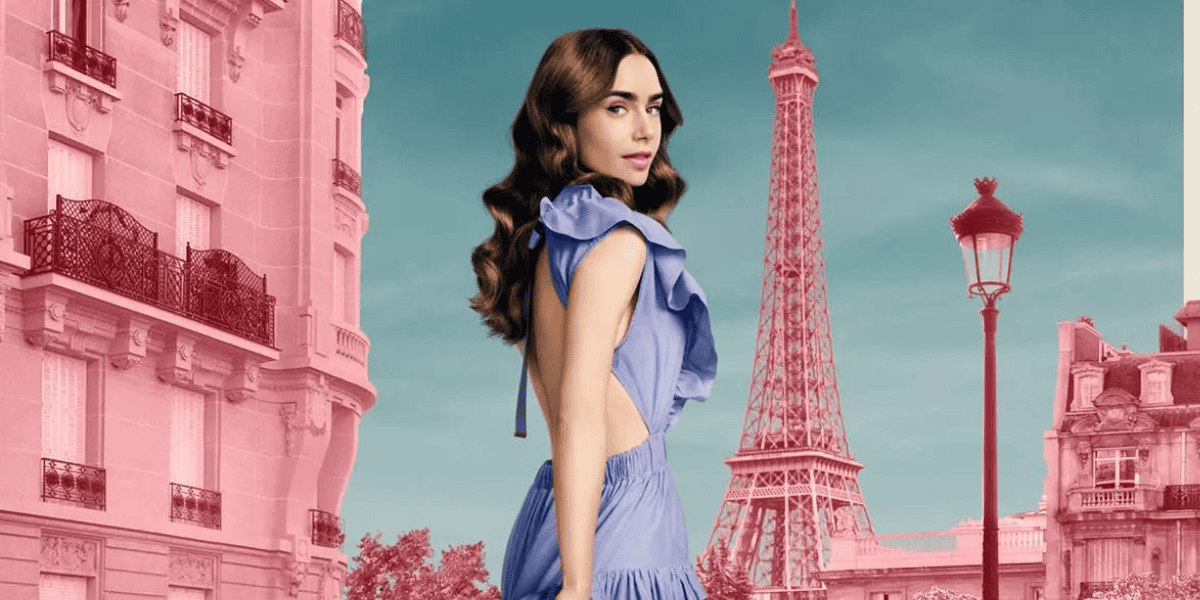The title character, played by Lily Collins, goes through a period of personal development in the City of Light during the meatier second season of the hit comedy series.
The fact that the creators of Emily in Paris are aware that at least half of their audience despises — DETESTS — Emily Cooper provides an immense amount of satisfaction.
When Lily Collins’s character, a gauche, jumped-up American marketing executive, chafes, whines, or sulks in defeat, it gives me a thrill in a way that reminds me of the strangely exquisite sting of pressing on a wound.
If the writing staff had no idea that her frequent humiliations cause many of us to feel delicious derision, they wouldn’t have had her (and her precious smartphone) gloriously sprayed in a stranger’s blood in the most recent season of the show.
The creation of Emily in Paris is like a delicately choreographed feast; the writers are tasked with simultaneously endearing her to the unironic enthusiasts and serving her on a silver platter to the hungry haters. The construction of Emily in Paris is like a feast that has been delicately choreographed. Everyone enjoys themselves to the fullest!
The critically acclaimed and Emmy Award–nominated Netflix comedy written and directed by Darren Star can be read in a variety of ways, including as a biting satire of femininity, as a sympathetic portrait of an ugly American, and as a reimagined version of the Sex and the City fan fiction in which Carrie ends up living her Paris dream instead of giving it all up to marry Big.

(Everyone saw how well that worked out in the end.) However, Emily in Paris is also a record of a woman’s attempt to redeem herself.
Emily Cooper is not exactly a naive naivete with Cinderella fantasies when she first arrives in Paris; rather, she is already well educated, fashionable, and a rising star in her field.
However, she lacks finesse in her performance. That je ne sais quoi. In contrast to the sweet first season, which focused on culture shock and cultural clash, the meatier second season delves into Emily’s personal development.
Her mental development is slow and almost imperceptible until the final two episodes of the season when you suddenly realize that yes, she might still be grating to the very end, but she is no longer the wide-eyed naivete she was when she stepped out of that cab in the fifth arrondissement. Her development is gradual and almost imperceptible until the final two episodes of the season. There is still a chance for Emily right now.
Read More: Sunisa Lee’s Boyfriend: What is Jaylin Smith’s relationship to Sunisa Lee?
Read more: Logan Paul Net Worth: What Is The Fortune Of Logan Paul In 2022?
In the first season, the junior executive who is based in Chicago is given a promotion and is sent to Paris for a brief stay to represent the interests of her American conglomerate, which has recently acquired a French boutique marketing firm.
During her time in Paris, she must deal with the fallout from the acquisition of the French company. At Savoir, she runs into a few condescending snobs, all of whom she eventually… sort of… wins over with her honest endeavors to win their favor (even if she consistently bungles client relations and conceitedly thinks she can right every wrong).
The young adult in her 20s also amasses a large number of romantic prospects, develops a few solid friendships, and, due to a misunderstanding, has sexual relations with the boyfriend of one of her new friends. As a result of the latter development, Season 2 is held back for several of its ten episodes of half an hour each due to Emily’s continued immersion in guilt and concealment.
In general, the second season is just as springy and munchable as the first, with the exception of the numerous, numerous, superfluous musical interludes featuring Emily’s disgraced billionairess best friend Mindy (Ashley Park) busking with her new street band. Overall, the second season is just as springy and munchable as the first.
(Don’t judge me too harshly; in order to get to the actual storyline of Glee, I used to fast forward through the musical numbers.) (Because I enjoy torturing myself.) Emily is still navigating her love triangle with the lifeless chef Gabriel (Lucas Bravo) and her friend Camille, who appears to be all sweetness and light (Camille Razat).
Emily had a one-night stand with Gabriel at the end of the previous season under the impression that he had ended things with Camille and was leaving Paris to start his own restaurant in Normandy.
However, she later found out that he had taken a last-minute opportunity to stay in the city after all. Emily is motivated to try to people-please her way out of this mess by Camille’s distress over her breakup. As a result, she encourages Gabriel and Camille to get back together, despite the fact that she still has feelings for Gabriel. Quels imbéciles!

After all of this dithering, as well as a sluggish rehashing of the gaffes and comedies of error from Season 1, the action finally picks up in the fourth episode of Season 2, when Emily is forced to face the consequences of her actions.
This highlight of the season forces her to confront her Americanness, including her tendency to want to fix rather than listen, her stubbornness that she should “work hard, play never,” and her dismissal of the French language. Emily gives Luc permission to take her to a screening of Jules et Jim, a classic example of the love triangle genre from the New Wave era, after being pressured by her Savoir team to finally learn French. The screening provides the hate watchers with some satisfying moments.
If Collins, the main cast member with the least amount of acting talent, were to win an award for this show, it would not be for her dramatic delivery, but rather for how skillfully she butchers her French pronunciation in order to highlight Emily’s lack of sophistication. It is not enough to simply give a woman from the Midwest an eccentric beret and address her as mademoiselle.
To that end, I’m really curious about the reasoning behind this bish’s decision to dress up like a Barbie doll from the mid-1990s. The costumes that were designed by Marylin Fitoussi are eye-catching showstoppers, such as Emily’s ruffled cold-shoulder magenta top/woolen Millennial pink tweed schoolgirl skirt combo, or her cerulean-and-chartreuse plaid off-the-shoulder sweetheart neckline and puffy sleeved mini dress; however, they appear ridiculous when worn by a human woman who actually exists in the real world.
At least Emily is able to divert her attention away from the unresponsive chef when she is introduced to cynical suit Alfie (played by Lucien Laviscount), a cockney-accented financier brat who is a student in her French class.
The strengths of Emily in Paris are not found in its plots or its dialogue, but rather in its characters. (Watch out for a pun involving the words “conjugate” and “consummate” in one of the earlier episodes.) As was the case in the first season, Emily’s coworkers continue to be the most interesting characters on the show.
This season, her exasperated supervisor Sylvie (Philippine Leroy-Beaulieu) finally becomes our hero’s Miranda Priestly, ascending into the spiky mentor role we were all patiently waiting for. She does this by playing the role of Miranda Priestly. The alluring and steely Leroy-Beaulieu is reminiscent of Isabelle Huppert in her most smirky moments.
Sylvie, much like Emily, is in the middle of a love triangle this time around, but hers has a decidedly European flavor. In addition, Bruno Gouery, who plays the mustachioed weirdo Luc, Emily’s champion, and Samuel Arnold, who plays the snarky glamourist Julien, Emily’s enemy, both deliver the most consistent comedic performance of anyone in the cast. (At one point, Julien makes a remark along the lines of, “Everyone’s looking for a French daddy.”) He does have a point.)
However, it is Kate Walsh (Grey’s Anatomy, Private Practice) who gives the true acting masterclass this season as Madeline, Emily’s boss in Chicago, in a guest turn near the end of the season. You can’t help but notice how much more developed Emily has become since the show’s pilot thanks to Walsh’s hilarious and high-spirited performance as a woman who plays a role that is both tacky and corporate.
Even she can’t help but cringe when she thinks about how, well, American everything is. I insist that there be a spinoff series titled Madeline in Paris! Emily may be a sniveling little careerist, but she is our sniveling little careerist. In the meantime.
Read more: “Star Trek: Picard” Season 2 is Getting a Limited-edition Steel Book Release!
Read more: Dr Dre Net Worth: What Is The Fortune of American Rapper In 2022?



Comments are closed.